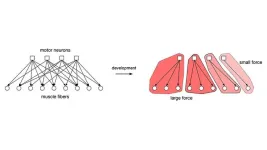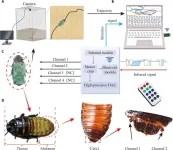(Press-News.org) A national survey conducted as part of University of Exeter research has found huge variation in treatment for ADHD, highlighting the struggle many young adults face once they turn 18.
Researchers have warned that the current system is failing many young adults as they transition from children’s to adult’s services - suddenly finding themselves unable to access treatment because services do not link up effectively.
More than 750 people from across the country – including commissioners, healthcare professionals working in primary care, and people with lived experience of ADHD – completed the MAP National Survey, which highlights challenges that GPs face when prescribing ADHD medication.
ADHD affects up to seven per cent of children and up to five per cent of adults, with symptoms including patterns of hyperactivity, impulsivity and/or inattention which interfere with functioning in daily life. Failure to treat ADHD and gaps in treatment, especially as young people become adults, can have severe impacts for patients and families, increasing the risk of mental health crises and difficulties with work, education, and relationships. This failure also places additional pressure on those working in health services.
The survey found variations in “shared care” agreements between GPs, mental health specialists and patients – which need to be in place for GPs to be able to prescribe ADHD medications. This was a particular problem when young people move to adult mental health services, suggesting the current system lets down adolescents at a critical time in their lives. Current NICE guidelines recommend GPs prescribe medication for adult ADHD patients under a shared care agreement with adult mental health services.
However, the survey found that such agreements are not always easy to set up, with evidence suggesting that GPs may not feel sufficiently supported to prescribe in this way. Indeed, if appropriate support is not in place, some GPs may not prescribe ADHD medication due to concerns around insurance and liability. This can be a particular problem for patients with a private diagnosis of ADHD, and leaves GPs unable to provide effective care, and many patients without access to the medication they need.
Furthermore, more than 40 per cent of survey respondents reported waiting times of two years or more for an appointment with adult mental health services. This leaves GPs with the responsibility for providing care, but without the support they need to offer the best care for their patients at a crucial time in their lives. This can include removing access to medication, despite the treatment having been successful during childhood. Issues with access to treatment for ADHD are also worst for some underserved groups, such as young women, and young people leaving care, which is increasing health inequalities.
The survey results come just as NHS England has announced the establishment of a taskforce and a major review of ADHD services. As stated by NHS England: “People with ADHD deserve a caring and effective service from the NHS and wider society. We know there is more to do, but we do not underestimate the complexity and challenges in realising this ambition.”
Dr Anna Price, Senior Research Fellow at the University of Exeter, said: “Our findings highlight the need for a coordinated approach to address problems that lead to a postcode lottery for patients trying to access treatment for ADHD. GPs and other primary care professionals really need better support so that they can provide shared care prescribing of ADHD medication in line with UK guidelines.
“We know that failing to treat ADHD can have a huge impact. Turning 18 is often a crucial and sensitive time in life, and our research shows that lack of treatment at this time can be particularly damaging for young people who are learning to self-manage their health needs, at the same time as perhaps sitting important exams, leaving home for the first time, and embarking on careers or university study.
“We welcome the establishment of the NHS England taskforce and is a much-needed step towards better outcomes for people with ADHD.”
University of Exeter experts have recently established a Science of ADHD and Neurodevelopment collaboration, working together with people who are experts by experience, and healthcare providers. The collaboration aims to develop solutions, such as curated digital interventions and standardised shared care agreement templates, to help people with ADHD to thrive.
The MAP National Survey was conducted as part of the MAP research project, funded by a National Institute for Health and Care Research (NIHR) Three Research Schools’ Mental Health Research Fellowship. Support for primary care prescribing for adult ADHD in England: national survey is published in British Journal of General Practice. A related article, which explored qualitative experiences of primary care provision for young people with ADHD across England, is published here: https://bjgp.org/content/early/2024/02/05/BJGP.2023.0626
CASE STUDY:
We can put you in touch with:
A 24 year old Iranian woman with ADHD, who sought a private diagnosis at the age of 21 after waiting for over a year and a half for NHS support. Barriers to diagnosis, and extended delays in accessing medication have made managing her health difficult - and she has had to take a year out from her university studies due to the severe impact of her unmanaged symptoms. She is currently going through a process of getting the right dosage for ADHD medication privately and hopes her GP will be able to continue to prescribe these medications once the right dosage has been found.
ENDS
END
Young adults let down by ‘postcode lottery’ for ADHD treatment - national survey
A national survey conducted as part of University of Exeter research has found huge variation in treatment for ADHD, highlighting the struggle many young adults face once they turn 18.
2024-09-03
ELSE PRESS RELEASES FROM THIS DATE:
False-positive mammography result may discourage women from subsequent screening
2024-09-02
Embargoed for release until 5:00 p.m. ET on Monday 2 September 2024
Annals of Internal Medicine Tip Sheet
@Annalsofim
Below please find summaries of new articles that will be published in the next issue of Annals of Internal Medicine. The summaries are not intended to substitute for the full articles as a source of information. This information is under strict embargo and by taking it into possession, media representatives are committing to the terms of the embargo not only on their own behalf, but also on behalf of the organization they represent.
----------------------------
1. ...
False-positive mammograms discourage some women from future screenings
2024-09-02
Early detection of breast cancer through mammography screening continues to save lives. However, abnormal findings on mammograms can lead to women being recalled for additional imaging and biopsies, many of which turn out to be “false positives,” meaning they do not result in a cancer diagnosis. False positives can also have financial implications for patients and cause significant emotional anxiety.
A major, new study led by the UC Davis Comprehensive Cancer Center has found that women who received a false-positive result that required additional imaging or biopsy were less likely to return ...
The nervous system’s matchmaker
2024-09-02
When you ask a rideshare app to find you a car, the company’s computers get to work. They know you want to reach your destination quickly. They know you’re not the only user who needs a ride. And they know drivers want to minimize idle time by picking up someone nearby. The computer’s job, says Cold Spring Harbor Laboratory Associate Professor Saket Navlakha, is to pair drivers with riders in a way that maximizes everyone’s happiness.
Computer scientists like Navlakha call this bipartite matching. It’s the same task handled by systems pairing organ donors with transplant candidates, medical students with residency ...
Open Wide: Human Mouth Bacteria Reproduce through Rare Form of Cell Division
2024-09-02
By Emily Greenhalgh
One of the most diverse ecosystems on the planet is closer than you think — right inside your mouth. Your mouth is a thriving ecosystem of more than 500 different species of bacteria living in distinct, structured communities called biofilms. Nearly all of these bacteria grow by splitting [or dividing] into two, with one mother cell giving rise to two daughter cells.
New research from the Marine Biological Laboratory (MBL) and ADA Forsyth uncovered an extraordinary mechanism of cell division in Corynebacterium matruchotii, one of the most common bacteria living in dental plaque. ...
KIMM develops wheel that alters stiffness in real time based on situation
2024-09-02
A new technology for wheels and mobile systems, necessary for overcoming various obstacles in daily life such as stairs or rocks by adjusting the stiffness of the wheel in real time, has been developed for the first time in the world. This noble technology is anticipated to find wide applications in various moving vehicles equipped with wheels, where overcoming terrain obstacles is essential.
The Korea Institute of Machinery and Materials (President Seog-Hyeon Ryu, hereinafter referred to as KIMM), an institute under the jurisdiction of the ...
Blood stem cell breakthrough could transform bone marrow transplants
2024-09-02
Melbourne researchers have made a world first breakthrough into creating blood stem cells that closely resemble those in the human body. And the discovery could soon lead to personalised treatments for children with leukaemia and bone marrow failure disorders.
The research, led by Murdoch Children’s Research Institute (MCRI) and published in Nature Biotechnology, has overcome a major hurdle for producing human blood stem cells, which can create red cells, white blood cells and platelets, that closely match those in the human embryo.
MCRI Associate Professor Elizabeth Ng said the team had made a significant discovery in human blood stem ...
Rare genetic variants linked to bicuspid aortic valve disease in young adults identified by UTHealth Houston researchers
2024-09-02
Genetic variants linked to a rare form of bicuspid aortic valve disease that affects young adults and can lead to dangerous and potentially life-threatening aortic complications have been identified by researchers at UTHealth Houston.
The study was published today in the American Journal of Human Genetics.
“We previously found that young individuals who present due to early onset thoracic aortic dissections are more likely to have bicuspid aortic valves and more likely to have rare variants in bicuspid aortic valve-associated genes,” said Siddharth Prakash, MD, PhD, co-principal investigator of the study and associate professor of medical ...
Locomotion control of cyborg insects by charge-balanced biphasic electrical stimulation
2024-09-02
A research paper by scientists at Beijing Institute of Technology proposed a universal system for remote signal output control using infrared signals.
The new research paper, published on Jul. 05 in the journal Cyborg and Bionic Systems, proposed a system that integrates high-precision digital-to-analog converters capable of generating customized waveform electrical stimulation signals within defined ranges. This enhances the accuracy of locomotion control in cyborg insects while maintaining real-time control and dynamic parameter adjustment. The proposed system is verified by experiments.
The integration of electronic stimulation devices with insects in ...
Depressed adolescents twice as likely to vape
2024-09-02
A study on vaping behaviour among Australian high school students has found those who reported severe depressive symptoms were over twice as likely to have tried e-cigarettes, compared to those reporting no depressive symptoms.
Data showed overall higher e-cigarette use among those with poorer mental health, including severe depressive symptoms, moderate and high stress, and low wellbeing.
The findings show a critical need for effective mental health support at the same time as vaping prevention during early adolescence -- when these issues first emerge.
The researchers surveyed over ...
Helping public decision-making with AI-based policy intelligence system
2024-09-02
Korean researchers are pushing for a new AI-based policy intelligence research project that can assist the public decision-making and policy execution of domestic and foreign local governments.
Electronics and Communications Research Institute (ETRI) announced on July 1 that they have decided to establish a cooperative system with the International Institute for Applied Systems Analysis (IIASA)1) to conduct further research regarding the development of an AI policy intelligence system that can assist public policy decision-making.
1) International Institute for Applied Systems Analysis (IIASA): An independent international research institute located ...
LAST 30 PRESS RELEASES:
Genetics help explain who gets the ‘telltale tingle’ from music, art and literature
Many Americans misunderstand medical aid in dying laws
Researchers publish landmark infectious disease study in ‘Science’
New NSF award supports innovative role-playing game approach to strengthening research security in academia
Kumar named to ACMA Emerging Leaders Program for 2026
AI language models could transform aquatic environmental risk assessment
New isotope tools reveal hidden pathways reshaping the global nitrogen cycle
Study reveals how antibiotic structure controls removal from water using biochar
Why chronic pain lasts longer in women: Immune cells offer clues
Toxic exposure creates epigenetic disease risk over 20 generations
More time spent on social media linked to steroid use intentions among boys and men
New study suggests a “kick it while it’s down” approach to cancer treatment could improve cure rates
Milken Institute, Ann Theodore Foundation launch new grant to support clinical trial for potential sarcoidosis treatment
New strategies boost effectiveness of CAR-NK therapy against cancer
Study: Adolescent cannabis use linked to doubling risk of psychotic and bipolar disorders
Invisible harms: drug-related deaths spike after hurricanes and tropical storms
Adolescent cannabis use and risk of psychotic, bipolar, depressive, and anxiety disorders
Anxiety, depression, and care barriers in adults with intellectual and developmental disabilities
Study: Anxiety, gloom often accompany intellectual deficits
Massage Therapy Foundation awards $300,000 research grant to the University of Denver
Gastrointestinal toxicity linked to targeted cancer therapies in the United States
Countdown to the Bial Award in Biomedicine 2025
Blood marker from dementia research could help track aging across the animal world
Birds change altitude to survive epic journeys across deserts and seas
Here's why you need a backup for the map on your phone
ACS Central Science | Researchers from Insilico Medicine and Lilly publish foundational vision for fully autonomous “Prompt-to-Drug” pharmaceutical R&D
Increasing the number of coronary interventions in patients with acute myocardial infarction does not appear to reduce death rates
Tackling uplift resistance in tall infrastructures sustainably
Novel wireless origami-inspired smart cushioning device for safer logistics
Hidden genetic mismatch, which triples the risk of a life-threatening immune attack after cord blood transplantation
[Press-News.org] Young adults let down by ‘postcode lottery’ for ADHD treatment - national surveyA national survey conducted as part of University of Exeter research has found huge variation in treatment for ADHD, highlighting the struggle many young adults face once they turn 18.




